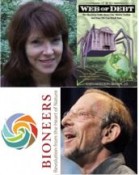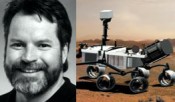Q&A: Bioneers – Ken Ausubel / Ellen Brown
Written on September 26th, 2012 |
Aired 09/23/12
This radio show aims to offer “pieces of the puzzle of a world that just might work.” I hope that if you listen a few times, you begin to imagine a future of revolutionary and evolutionary success.
My hope is rooted in this vision: Reality is not dead, mechanical, or separate; in fact, it is alive, evolving, and composed of interdependent systems.
I believe this worldview has been shared by indigenous peoples for millennia, revealed by science since early in the 20th century, and obvious every time we walk outside or look into the eyes of another living creature.
This vision inspires the annual Bioneers conference that takes place each fall (this year October 19-21) in San Rafael, just north of San Francisco. I’ll be talking with Bioneers founder and co-director, KEN AUSUBEL, and one of this year’s speakers, ELLEN BROWN, President of the Public Banking Institute and author of WEB OF DEBT.
Human creativity focused on problem solving can explode the narrative of despair. For the most part the solutions to our problems already exist. Bioneers focuses on strategies to help us realize these solutions by restoring community, justice and democracy.
Other speakers this year include BILL McKIBBEN, PAUL HAWKEN, ETHAN NADELMANN, GABOR MATE, and LA’s own JODIE EVANS and ANDY LIPKIS.
http://publicbankinginstitute.org
Q&A: ROB MANNING Chief Engineer, Mars Science Laboratory
Written on August 8th, 2012 |
Aired 08/05/12
ROB MANNING is the Chief Engineer for the Mars Science Laboratory (MSL) mission. MANNING has been designing, testing and operating robotic spacecraft and rovers for 30 years at the Jet Propulsion Laboratory (JPL) in Pasadena. In the 1990’s Rob was chief engineer for Mars Pathfinder, the first to send a rover to Mars. He also led flight system engineering for the Rover Entry, Descent and Landing teams. Rob is in the Aviation Week Magazine Space Laureate Hall of Fame in the Smithsonian Air and Space Museum.
We talk just hours before the rover Curiosity landed on Mars. Using a never-before-tried landing system called a “sky crane,” the degree of difficulty of this landing is enormous. After parachuting to within one mile of the surface, the sky crane fires thrusters to lower itself to hover over the surface. While hovering, Curiosity is lowered to the ground on cables. Once the cables are released, the sky crane jets to a safe distance before crashing to the ground, leaving the rover to explore the planet’s surface. We’ll talk with Manning about the aims as well as the challenges of this mission.
Q&A: Peter Diamandis-Abundance Ahead
Written on March 28th, 2012 |
Aired 03/25/12
Recently the annual TED conference took place in Long Beach California. I have long recommended its famous 18 minute TED talks. Check out TED.com/talks, they cover a wide range of topics including science, technology, design, business, global issues and they have recurring themes of inspiration, challenge, and optimism. Not unlike what I try to do with this radio show.
On opening day the recent conference scheduled two talks one after the other. The first by Paul Gilding entitled The Earth is Full asked questions like Have we used up all our resources? Have we filled up all the livable space on Earth? Gilding suggests we have with the possibility of devastating consequences. In a talk that’s equal parts terrifying and oddly hopeful, he says “It takes a good crisis to get us going. When we feel fear and we fear loss we are capable of quite extraordinary things.”
That talk was followed by one by today’s guest, PETER DIAMANDIS, entitled Abundance Is Our Future in which he makes the case for optimism — that we’ll invent, innovate and create ways to solve the challenges that loom over us. “I’m not saying we don’t have our set of problems — problems – climate crisis, species extinction, water and energy shortage – we surely do. But ultimately, we knock them down.”
Since the dawn of humanity, a privileged few have lived in stark contrast to the majority. Conventional wisdom says this gap cannot be closed. But, according to a new book by Diamandis and co-author Steven Kotler, it is closing-fast. In Abundance: The Future is Better Than You Think, they document how progress in artificial intelligence, robotics, infinite computing, ubiquitous broadband networks, digital manufacturing, nanomaterials, synthetic biology, and many other exponentially growing technologies will enable us to make greater gains in the next two decades than we have in the previous two hundred years. They believe we will soon have the ability to meet and exceed the basic needs of every man, woman, and child on the planet.
http://www.abundancethebook.com
Q&A: Oran Hesterman/Fair Food; Leila Conners/Urban Roots
Written on March 18th, 2012 |
Aired 11/13/11
Some bad news:
In 2008 more than 50% of all US harvested cropland grew only two crops – corn and soybeans and more than 40% of the food calories consumed worldwide came from just three crops: wheat, corn and rice.
30% of Detroit residents receive food stamps, but 92% of Detroit’s food stamp retailers offer few or no fresh fruit or vegetables.
The average plate of food eaten in our homes or restaurants travels 1,500 miles from where the food is grown. Our food system consumes 10.3 calories of fossil fuel energy to produce 1.4 calories of food energy.”
And some good news:
There are now 8000 farm to school programs across the US. Eight years ago there were only 4. There are now 6000 farmers’ markets in the US three times as many as in 1995. 330 hospitals in the US and Canada have pledged to purchase food that is grown according to Fair Food principles.
In recent years a number of books and films have documented the dangers of our current food system, and a number of those have been featured on Free forum. Just as you can’t alter the course of climate change by simply switching to efficient light bulbs, today’s guests believe that you can’t fix the broken food system by simply growing a backyard garden. It requires redesigning our food system.
My first guest, ORAN HESTERMAN has a new book FAIR FOOD, a guide to changing not only what we eat, but how our food is grown, packaged, delivered, marketed and sold. Hesterman opens the book talking about Detroit, Michigan, an unlikely beacon of hope in the fight for fair food.
Prior to starting the Fair Food Network, where he is President & CEO, ORAN HESTERMAN was the inaugural president of Fair Food Foundation, leading their sustainable food systems programs. Before that, he researched and taught in the crop and soil sciences department at Michigan State University in East Lansing, and for more than 15 years he co-led the Integrated Farming Systems and Food and Society Programs for the W.K. Kellogg Foundation, during which time the Foundation seeded the local food systems movement with over $200 million. FAIR FOOD is his first book.
My second guest LEILA CONNERS, a founder of Tree Media in Santa Monica, is a producer of URBAN ROOTS, a documentary on the food revolution taking place in Detroit. Directed by Detroit-native Mark McInnis the film tells the powerful story of a group of dedicated Detroiters working tirelessly to fulfill their vision for locally-grown, sustainably farmed food in a city where people — as in much of the county — have found themselves cut off from real food and limited to lifeless offerings of fast food chains, mini-marts, and grocery stores stocked with processed food from thousands of miles away.
LEILA CONNERS is Founder and President of Tree Media Group. Conners is director, producer, and writer on THE 11TH HOUR, as well as the short films “Global Warning” and “Water Planet” (all with Leonardo DiCaprio). She was Associate Editor at New Perspectives Quarterly and Global Viewpoint, focusing on international politics and social issues. She is producer of URBAN ROOTS.
fairfoodbook.org, fairfoodnetwork.org, urbanrootsamerica.com, treemedia.com
Q&A: WINIFRED GALLAGHER, Author – Understanding Our Need for Novelty and Change
Written on January 31st, 2012 |
Aired 01/29/12
Though change has never been as rapid as it is today, adapting to new circumstance is so crucial to our survival that “love of the new” is hardwired into our brains at the deepest levels. The number of new things we confront – from products to information – has quadrupled in the last thirty years with no signs of slowing.
In NEW: Understanding Our Need for Novelty and Change, WINIFRED GALLAGHER points out that 15% of us are “neophiliacs,” biologically predisposed to passionately pursue new experiences. Another 15% are “neophobes” who resist change. Most of us fall in the middle.
WINIFRED GALLAGHER has written for magazines from The Atlantic Monthly to Rolling Stone. Her books include Just the Way You Are: How Heredity and Experience Create the Individual, a New York Times Notable Book of the Year, The Power of Place: How Our Surroundings Shape Our Thoughts, Emotions, and Actions; and Rapt: Attention and the Focused Life.
